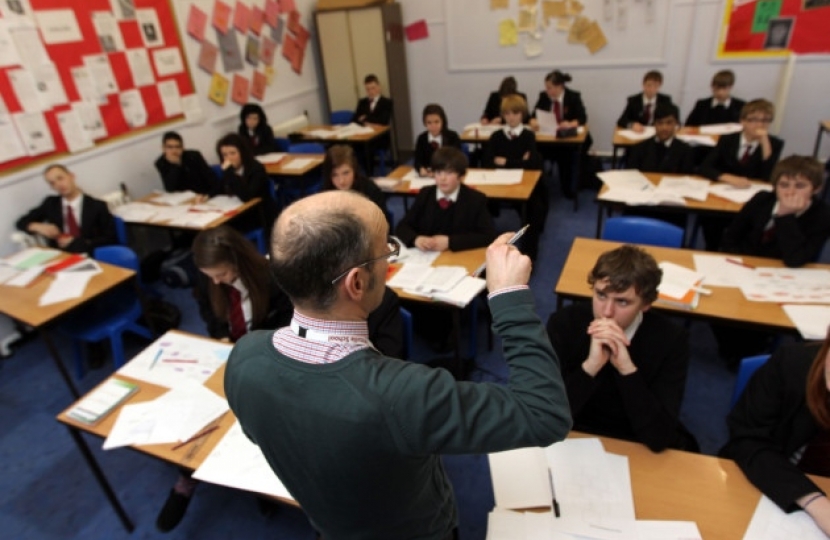
Nigel Burgoyne, headteacher at Kesgrave High School, said budget reserves are becoming depleted after years of savings, leaving Suffolk’s school leaders “struggling” to avoid staff redundancies and curriculum cuts.
His comments come after every Suffolk headteacher was expected to write to their MP today to express deep concerns over drastic cuts proposed by the government’s controversial shake-up of school funding. A total of 3,000 schools from 14 counties, including Suffolk and Norfolk, joined the initiative.
Education secretary Justine Greening faces growing pressure to abandon or reform the proposed national funding formula (NFF), unveiled last December. Public consultation ends at midnight on Thursday. See here to respond.
The single formula would calculate the amount individual schools should be allocated per pupil, replacing an old, patchwork system with anomalies and ending a “postcode lottery” which many claim favours London and large cities over shire counties.
In Suffolk, 56 out of 300 schools would lose a total of £1.2m – around 35 teachers in total. They are mainly primary schools in deprived areas of Ipswich and other Suffolk rural schools. Six would lose over £50,000.
On average, per-pupil funding in Suffolk would rise by £118 to £4,489. But this is £307 below the national average. Tower Hamlets, for example, would receive £6,792. Suffolk would also remain in the bottom 50 funded local authorities.
Kesgrave High School would be one of the ‘winners’ if the NFF was implemented. Its budget would rise by £87,000 to £6,477,000.
But as previously warned by education experts, even the NFF ‘winners’ face real-terms cuts due to rising costs, inflation and other ‘stealth taxes’.
Mr Burgoyne said: “In real terms, per-pupil funding would leave us £450,000 every year worse off (than the national average). That’s fairly catastrophic, and under the proposals, the small amount we would get would be wiped out by cuts which are coming through. That is the reality.
“My budget for this coming September is £112,000 down on last year. We also have rising costs, like staff pay rises at 1%, exam increases and so on, which would amount to at least £90,000. So we have got to find £200,000 for this September.
“We can only do that through cutting staff resources – like not replacing 10-year-old computers which are starting to die. There’s pressure on everything we provide. There are no places we can go now to make savings. We have been making savings for the past five years. Now we are putting more pressure on our staff through bigger class sizes, and it is just not tenable any more.
“We have been reducing our staff numbers for five years. Fortunately we have done it through movement, not redundancies. But still we are having to cut back on provision. That is starting to hurt big time.”
He said they were “trying to hold on to subjects” in the curriculum.
“We (Suffolk headteachers) are all very worried. They have been managing their resources, but now the reserves have gone and we are in a situation where we know we are struggling to keep the thing going. That’s frustrating when the government doesn’t recognise that and wasting money, in my view, on expanding free schools and grammar schools potentially if they get approval when base funding isn’t adequate.
“The new formula is not doing anything to address the underfunding in Suffolk which has been there for decades. We were promised they would put it right, but the funding formula does not put it right.
“We have pressured for a national fair funding formula, but it has got to be properly funded. If we compare a school like Kesgrave to one in Hackney, they get about £3 million more a year. I’m sorry, that can’t be necessary.
“We believe in fair funding in difficult times of austerity, but we have to have base funding which is adequate, regardless of the ability of the youngsters. We want a fair funding policy, not one which is just a bit of a mess.”
South Suffolk MP James Cartlidge met with Ms Greening yesterday and told her the NFF will not be effective unless the Treasury agrees to provide more cash overall for schools.
He said: “She is going to have to seriously lobby the Chancellor for new money to go into the settlement, or it is unlikely to deliver the once-in-a-generation boost that we were promised.
“While money is tight at the moment, in my view school and education should be the top public spending priority and we are going to have to think seriously about what our priorities are.”
The Department for Education said: “The Government has protected the core schools budget in real terms since 2010, with school funding at its highest level on record at more than £40bn in 2016-17 - and that is set to rise, as pupil numbers rise over the next two years, to £42 billion by 2019-20.
“Under the proposed formula, schools in 13 out of the 14 areas of the country in question will receive an increase in funding, totalling more than £98m.”
Published by The Ipswich Star
